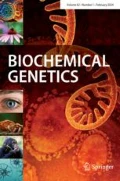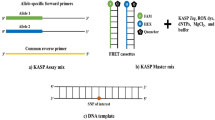Abstract
Origanum L. (Lamiaceae) is an important genus of medicinal and aromatic plants used since ancient times as culinary herbs and remedies in traditional medicine. Although it is a relatively small genus, intra-generic species delineation, as well as its inter-generic relationships within tribe Mentheae, are still poorly understood. High resolution melting (HRM) analysis, coupled with microsatellite markers (SSRs), could facilitate the molecular identification and characterization of certain genotypes more efficiently and relatively faster when compared to other analytical methods. In this study, 38 Origanum samples corresponding to six Origanum taxa (O. dictamnus, O. majorana, O. onites, O. scabrum, O. sipyleum, and O. vulgare subsp. hirtum) were analyzed, using six microsatellite loci. Our goal was to molecularly identify and discriminate among the selected samples and to evaluate the ability of the HRM technique as an analytical tool for the discrimination of Origanum species from Greece. The temperature-shifted melting curves produced by the HRM analysis, resulted in 98 unique HRM profiles, which enabled the discrimination of the Origanum genotypes studied. According to the similarity dendrogram based on the HRM profiles, six unique clusters were formed, each one corresponding to a single taxon. In conclusion, HRM genotyping provided a fast, cost-effective method, well suited for the molecular characterization and identification of Origanum taxa and for the authentication of the original genetic material.


Similar content being viewed by others
Data Availability
The experimental data are available upon request.
References
Aboukhalid K, Machon N, Lambourdiere J, Abdelkrim J, Bakha M, Douaik A, Korbecka-Glinka G, Gaboun F, Tomi F, Lamiri A, Al Faiz C (2017) Analysis of genetic diversity and population structure of the endangered Origanum compactum from Morocco, using SSR markers: Implication for conservation. Biol Conserv 212:172–182. https://doi.org/10.1016/j.biocon.2017.05.030
Azizi A, Wagner C, Honermeier B, Friedt W (2009) Intraspecific diversity and relationship between subspecies of Origanum vulgare revealed by comparative AFLP and SAMPL marker analysis. Plant Syst Evol 281:151–160. https://doi.org/10.1007/s00606-009-0197-1
Bakkali F, Averbeck S, Averbeck D, Idaomar M (2008) Biological effects of essential oils: a review. Food Chem Toxicol 46:446–475. https://doi.org/10.1016/j.fct.2007.09.106
Ballin NZ, Onaindia JO, Jawad H, Fernandez-Carazo R, Maquet A (2019) High-resolution melting of multiple barcode amplicons for plant species authentication. Food Control 105:141–150. https://doi.org/10.1016/j.foodcont.2019.05.022
Bariotakis M, Koutroumpa K, Karousou R, Pirintsos SA (2016) Environmental (in)dependence of a hybrid zone: Insights from molecular markers and ecological niche modeling in a hybrid zone of Origanum (Lamiaceae) on the island of Crete. Ecol Evol 6:8727–8739. https://doi.org/10.1002/ece3.2560
Buddhachat K, Changtor P, Ninket S (2019) An accurate and rapid method for species identification in plants: melting fingerprint-high resolution melting (MFin-HRM) analysis. Plant Gene 20:100203. https://doi.org/10.1016/j.plgene.2019.100203
Bosmali I, Ordoudi SA, Tsimidou MZ, Madesis P (2017) Greek PDO saffron authentication studies using species specific molecular markers. Food Res Int 100:899–907. https://doi.org/10.1016/j.foodres.2017.08.001
Dimopoulos P, Raus T, Bergmeier E, Constantinidis T, Iatrou G, Kokkini S, Strid A, Tzanoudakis D (2016) Vascular plants of Greece: an annotated checklist. Suppl Willdenowia 46(3):301–347. https://doi.org/10.3372/wi.46.46303
Dimopoulos P, Raus Th, Bergmeier E, Constantinidis Th, Iatrou G, Kokkini S, Strid A, Tzanoudakis D (2013) Vascular plants of Greece: An annotated checklist. Berlin: Botanic Garden and Botanical Museum Berlin-Dahlem; Athens: Hellenic Botanical Society. Englera 31
Distefano G, Caruso M, La Malfa S, Gentile A, Wu SB (2012) High resolution melting analysis is a more sensitive and effective alternative to gel-based platforms in analysis of SSR: an example in citrus. PLoS ONE 7(8):e44202. https://doi.org/10.1371/journal.pone.0044202
El-Demerdash ES, Elsherbeny EA, Salama YAM, Ahmed MZ (2019) Genetic diversity analysis of some Egyptian Origanum and Thymus species using AFLP markers. J Genet Eng Biotechnol 17(1):13. https://doi.org/10.1186/s43141-019-0012-5
Ganopoulos I, Xanthopoulou A, Mastrogianni A, Drouzas A, Kalivas A, Bletsos F, Krommydas SK, Ralli P, Tsaftaris A, Madesis P (2015) High resolution melting (HRM) analysis in eggplant (Solanum melongena L.): a tool for microsatellite genotyping and molecular characterization of a Greek Genebank collection. Biochem Syst Ecol 58:64–71. https://doi.org/10.1016/j.bse.2014.11.003
Ganopoulos I, Argiriou A, Tsaftaris A (2011) Microsatellite high resolution melting (SSR-HRM) analysis for authenticity testing of protected designation of origin (PDO) sweet cherry products. Food Control 22:532–541. https://doi.org/10.1016/j.foodcont.2010.09.040
Gomes S, Breia R, Carvalho T, Carnide V, Martins-Lopes P (2018) Microsatellite high-resolution melting (SSR-HRM) to track olive genotypes: from field to olive oil. J Food Sci 83(10):2415–2423. https://doi.org/10.1111/1750-3841.14333
Govindaraj M, Vetriventhan M, Srinivasan M (2015) Importance of genetic diversity assessment in crop plants and its recent advances: an overview of its analytical perspectives. Genet Res Int. https://doi.org/10.1155/2015/431487
Hampl V, Pavlícek A, Flegr J (2001) Construction and bootstrap analysis of DNA fingerprinting-based phylogenetic trees with a freeware program FreeTree: application to trichomonad parasites. Int J Syst Evol Microbiol 51:731–735. https://doi.org/10.1099/00207713-51-3-731
Ichim MC (2019) The DNA-based authentication of commercial herbal products reveals their globally widespread adulteration. Front Pharmacol 10:1227. https://doi.org/10.3389/fphar.2019.01227
Ietswaart JH (1980) A taxonomic revision of the genus Origanum (Labiatae). Leiden Botanical Series 4. Leiden University Press, The Hague
Katsiotis A, Nikoloudakis N, Linos A, Drossou A, Constantinidis T (2009) Phylogenetic relationships in Origanum spp. based on rDNA sequences and intra-genetic variation of Greek O. vulgare subsp. hirtum revealed by RAPD. Sci Hortic 121:103–108. https://doi.org/10.1016/j.scienta.2009.01.015
Knopkiewicz M, Gawlowska M, Swiecicki W (2014) The application of high resolution melting in the analysis of simple sequence repeat and single nucleotide polymorphism markers in a pea (Pisum sativum L.) population. Czech J Genet Plant Breed 50(2):151–156
Kokkini S, Karousou R, Hanlidou E (2003) Herbs of the Labiatae. In: Cabarello B, Trugo L, Finglas P (eds) Encyclopedia of food science and nutrition. Academic Press, Amsterdam, pp 3082–3090
Kokkini S, Karousou R, Vokou D (1994) Pattern of geographic variation of Origanum vulgare trichomes and essential oil content in Greece. Biochem Syst Ecol 22:517–528. https://doi.org/10.1016/0305-1978(94)90046-9
Lamien-Meda A, Fuehrer HP, Noedl H (2019) Data on high resolution melting (HRM) and phylogenetic analysis of P. ovale wallikeri and P. ovale curtisi. Data Brief 24:103937. https://doi.org/10.1016/j.dib.2019.103937
Li J, Xiong C, He X, Lu Z, Zhang X, Chen X, Sun W (2018) Using SSR-HRM to identify closely related species in herbal medicine products: a case study on licorice. Front Pharmacol 9:407. https://doi.org/10.3389/fphar.2018.00407
Li W, Matsuoka M, Kai M, Thapa P, Khadge S, Hagge DA, Brennan PJ, Vissa V (2012) Real-time PCR and high-resolution melt analysis for rapid detection of Mycobacterium leprae drug resistance mutations and strain types. J Clin Microbiol 50(3):742–753. https://doi.org/10.1128/JCM.05183-11
Lukas B, Samuel R, Mader E, Baser KHC, Duman H, Novak J (2013) Complex evolutionary relationships in Origanum section Majorana (Lamiaceae). Bot J Linn Soc 171:667–686. https://doi.org/10.1111/boj.12022
Madesis P, Ganopoulos I, Bosmali I, Tsaftaris A (2013) Barcode high resolution melting analysis for forensic uses in nuts: a case study on allergenic hazelnuts (Corylus avellana). Food Res Int 50(1):351–360. https://doi.org/10.1016/j.foodres.2012.10.038
Mader E, Lukas B, Novak J (2008) A strategy to setup codominant microsatellite analysis for high-resolution-melting-curve-analysis (HRM). BMC Genet 9:1–8. https://doi.org/10.1186/1471-2156-9-69
Marieschi M, Torelli A, Poli F, Sacchetti G, Bruni R (2009) RAPD-based method for the quality control of Mediterranean oregano and its contribution to pharmacognostic techniques. J Agric Food Chem 57:1835–1840. https://doi.org/10.1021/jf8032649
Mishra P, Shukla AK, Sundaresan V (2018) Candidate DNA barcode tags combined with high resolution melting (Bar-HRM) curve analysis for authentication of Senna alexandrina Mill. with validation in crude drugs. Front Plant Sci. https://doi.org/10.3389/fpls.2018.00283
Novak J, Lukas B, Bolzer K, Grausgruber-Groger S, Degenhardt J (2008) Identification and characterization of simple sequence repeat markers from a glandular Origanum vulgare expressed sequence tag. Mol Ecol Resour 8:599–601. https://doi.org/10.1111/j.1471-8286.2007.02059.x
Papaioannou C, Stefanakis MK, Batargias C, Kilias G, Anastasopoulos E, Katerinopoulos HE, Papasotiropoulos V (2020) Genetic profiling and volatile oil content of oregano genotypes from Greece. Rev Bras Farmacogn. 30:295–300. https://doi.org/10.1007/s43450-020-00016-6
Pereira L, Gomes S, Castro C, Eiras-Dias JE, Brazao J, Graca A, Fernandes JR, Martins-Lopes P (2017) High resolution melting (HRM) applied to wine authenticity. Food Chem 216:80–86. https://doi.org/10.1016/j.foodchem.2016.07.185
Raizada A, Souframanien J (2019) Transcriptome sequencing, de novo assembly, characterisation of wild accession of blackgram (Vigna mungo var. silvestris) as a rich resource for development of molecular markers and validation of SNPs by high resolution melting (HRM) analysis. BMC Plant Biol 19:358. https://doi.org/10.1186/s12870-019-1954-0
Song M, Li J, Xiong C, Liu H, Liang J (2016) Applying high-resolution melting (HRM) technology to identify five commonly used Artemisia species. Sci Rep 6:34133. https://doi.org/10.1038/srep34133
Sun W, Li JJ, Xiong C, Zhao B, Chen SL (2016) The potential power of Bar-HRM technology in herbal medicine identification. Front Plant Sci 7:367. https://doi.org/10.3389/fpls.2016.00367
Taşcıoğlu T, Sadikoglu N, Doganlar S, Frary A (2018) Molecular genetic diversity in the Origanum genus: EST-SSR and SRAP marker analyses of the 22 species in eight sections that naturally occur in Turkey. Ind Crops Prod 123:746–761. https://doi.org/10.1016/j.indcrop.2018.07.027
Vannozzi A, Lucchin M, Barcaccia G (2018) cpDNA barcoding by combined End-Point and Real-Time PCR analyses to identify and quantify the main contaminants of oregano (Origanum vulgare L.) in commercial batches. Diversity 10(3):98. https://doi.org/10.3390/d10030098
Varshney RK, Graner A, Sorrells ME (2005) Genetic microsatellite markers in plants: features and applications. Trends Biotechnol 23(1):48–55. https://doi.org/10.1016/j.tibtech.2004.11.005
Vietina M, Agrimonti C, Marmiroli N (2013) Detection of plant oil DNA using high resolution melting (HRM) post PCR analysis: a tool for disclosure of olive oil adulteration. Food Chem 141(4):3820–3826. https://doi.org/10.1016/j.foodchem.2013.06.075
Xanthopoulou A, Ganopoulos I, Kalivas A, Osathanunkul M, Chatzopoulou P, Tsaftaris A, Madesis P (2016) Multiplex HRM analysis as a tool for rapid molecular authentication of nine herbal teas. Food Control 60:113–116. https://doi.org/10.1016/j.foodcont.2015.07.021
Xanthopoulou A, Ganopoulos I, Koubouris G, Tsaftaris A, Sergendani C, Kalivas A, Madesis P (2014) Microsatellite high-resolution melting (SSR-HRM) analysis for genotyping and molecular characterization of an Olea europaea germplasm collection. Plant Gen Res 12(3):273–277. https://doi.org/10.1017/S147926211400001
Acknowledgements
We would like to thank Drs. Elias Anastasopoulos, Eleftherios Kalpoutzakis, Aris Zografidis, Ms. Spyridoula Christopoulou and Mrs. Maria Tsakiri for collection and identification of plant material.
Funding
We acknowledge support of this work by the project “PlantUP” (MIS 5002803) which is implemented under the Action “Reinforcement of the Research and Innovation Infrastructure”, funded by the Operational Programme "Competitiveness, Entrepreneurship and Innovation" (NSRF 2014–2020) and co-financed by Greece and the European Union (European Regional Development Fund).
Author information
Authors and Affiliations
Contributions
Charikleia Papaioannou and Konstantina Zeliou contributed to the experimental part, data analysis, literature search and drafted the manuscript. Panayiotis Trigas contributed to drafting and critical reading of the manuscript. Vasileios Papasotiropoulos designed the study, supervised the experiments, contributed to drafting and critical reading of the manuscript. All the authors have read the final manuscript and approved the submission.
Corresponding author
Ethics declarations
Conflict of interest
The authors declare that they have either no conflict of interest or competing interests.
Additional information
Publisher's Note
Springer Nature remains neutral with regard to jurisdictional claims in published maps and institutional affiliations.
Electronic supplementary material
Below is the link to the electronic supplementary material.
Rights and permissions
About this article
Cite this article
Papaioannou, C., Zeliou, K., Trigas, P. et al. High Resolution Melting (HRM) Genotyping in the Genus Origanum: Molecular Identification and Discrimination for Authentication Purposes. Biochem Genet 58, 725–737 (2020). https://doi.org/10.1007/s10528-020-09970-1
Received:
Accepted:
Published:
Issue Date:
DOI: https://doi.org/10.1007/s10528-020-09970-1




